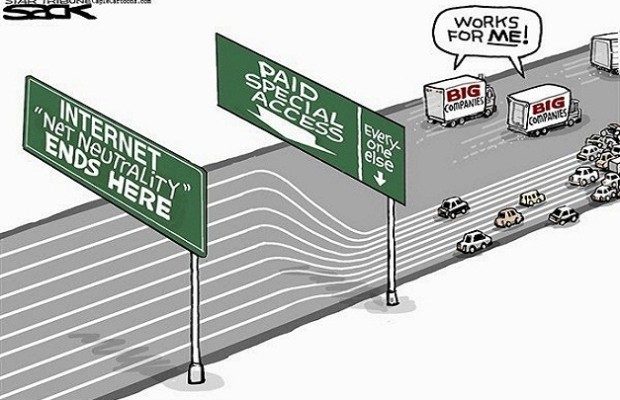This has been originally published on EBN
As I explained in my last blog, the real job creators in any free-market economy are not only producers but also consumers. Monopoly capitalism has resulted in poor economic demand due to reduced consumer purchasing power. On this site, I’ve also discussed the possibility of an early demise for Moore’s Law due to monopoly capitalism, as opposed to a natural demise due to physics. In a Semi.org article, I explained how the loss of a free-market economy due to monopoly capitalism produced a poor return on investment in the transition to 450mm silicon wafers for the global semiconductor industry, bringing this profitable business to a standstill.
At the 2014 Web Summit this month in Dublin, industry leaders came together to discuss the future of Internet of Things (IoT) technology. The global semiconductor industry is now interested in the IoT mainly because the Internet has flourished at a greater level than the voice telephony industry, due to absence of government-sanctioned monopolies. In my book Mass Capitalism: A Blueprint for Economic Revival, I make a case that, even though voice over Internet protocol (VoIP) requires the same bandwidth to send voice data as Internet packets when compared to voice packets transferred over standard telephony infrastructure, the prices that consumers pay for VoIP services are much lower than what they pay using standard telephony infrastructure.
The real reason voice telephony infrastructure prices have not fallen, in spite of the rapid market growth of cellphones and smartphones, can be traced to government-approved monopolies. Political corruption has enabled crony capitalists to influence the decisions of United Nations’ International Telecommunications Union and prevent telecommunications prices from falling, in spite of the relentless progress of Moore’s Law. I explain this in “Moore’s Law for Integrated Circuits: Maintaining Its Innovation and Business Impact for the Semiconductor Industry,” a chapter of my newly released book.
Since VoIP did not make use of an infrastructure from the old telephony system, it avoided monopolies and fueled the growth of the Internet revolution exponentially. Now monopoly capitalism in the semiconductor industry is bringing this capital-intensive business to a standstill. Very few players dominate this industry. Meanwhile, crony capitalists are trying to establish Internet monopolies through their lobbying efforts.
As a result of these lobbying efforts, in January 2014, the US Court of Appeals, the second-highest court in the US, knocked down Federal Communication Commission’s long-standing regulation requiring “network neutrality.” Without network neutrality, the growth of the IoT industry will likely come to a standstill due to poor consumer demand, just like our global semiconductor industry.
Since the United States does not have free-market capitalism anymore, as it had in the 1950s through the 1970s, government intervention offers one way to stop the growth of Internet monopolies. Hence, President Obama is absolutely correct in calling on the FCC to impose “the strongest possible rules” to protect net neutrality — prohibiting Internet service providers from favoring some lawful content over others, and thus avoiding the creation of Internet industry monopolies that would stagnate the IoT’s growth. It is possible to have minimal government intervention into the economy and a self-regulation of the economy only by means of implementing a free-market economic system. Free-market economic reforms would also result into exponential growth for the IoT sector. Letting employee wages automatically catch up with employee productivity would boost consumer demand.
Employee-owned companies with a neo-cooperative management would also ensure that all the people in an economy are real stakeholders in that economy, bringing about an economic democracy. This new system would create plenty of jobs and put an end to the debate about having only few people pay taxes and the rest living on unemployment benefits. It would eliminate political corruption in the US democracy, as majority shareholders of the corporations (employees) would not allow laws that would hurt their own interests. Such an economic democracy would add value to the political democracy and make it a stakeholder democracy that would truly work as a government of the people, for the people, and by the people.
In this way, mass capitalism-based reforms offer a free-market solution to achieve net neutrality with minimal government intervention, a smaller government, and lower taxes on individuals.


Recent Comments